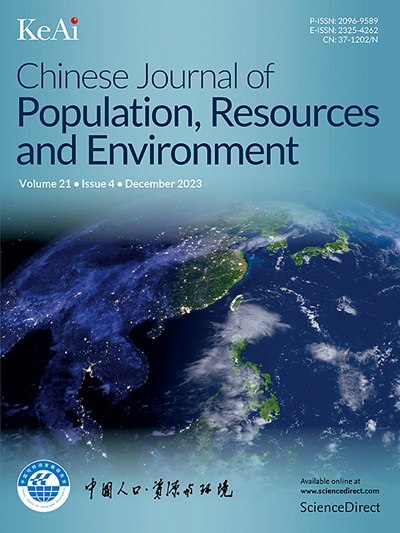How does the digital economy affect ecological welfare performance? Evidence from 285 prefecture-level cities in China
IF 4.8
4区 环境科学与生态学
Q2 ENVIRONMENTAL STUDIES
Chinese Journal of Population Resources and Environment
Pub Date : 2025-06-01
DOI:10.1016/j.cjpre.2025.05.012
引用次数: 0
Abstract
As a novel economic paradigm that drives high-quality economic development, the digital economy (DE) can potentially significantly enhance the utilization efficiency of ecological resources and improve human well-being. Based on panel data from 285 prefecture-level cities in China spanning 2011–2021, this study empirically investigates the direct effects, transmission mechanisms, and spatial spillover effects of the DE on ecological welfare performance (EWP) using benchmark regression, intermediary effects, and spatial Durbin models. The results show that the DE significantly improved EWP in Chinese cities. This conclusion remains valid even after controlling for relevant influencing factors. Two transmission paths—upgrading of the industrial structure (UIS) and green innovation (GI)—significantly impacted EWP, as verified by the mediation effect model. Additionally, the mediating effect of the UIS was stronger than that of GI. Spatial heterogeneity tests show that the DE had significant effects on the EWP of eastern cities, with little impact on the central and western cities. Accordingly, grounded in regional developmental disparities, the empowering effects of the DE must be fully harnessed to foster an ecological civilization and enhance the well-being of the populace.
数字经济如何影响生态福利绩效?来自中国285个地级市的证据
数字经济作为推动经济高质量发展的新型经济范式,具有显著提高生态资源利用效率和改善人类福祉的潜力。基于2011-2021年中国285个地级市的面板数据,运用基准回归、中介效应和空间Durbin模型,实证研究了生态福利绩效(EWP)的直接效应、传导机制和空间溢出效应。结果表明,DE显著提高了中国城市的EWP。即使在控制了相关影响因素后,这一结论仍然有效。产业结构升级(UIS)和绿色创新(GI)两条传导路径显著影响EWP,中介效应模型验证了这一点。此外,UIS的中介作用强于GI。空间异质性分析表明,DE对东部城市EWP的影响显著,对中西部城市的影响较小。因此,必须立足区域发展差异,充分发挥经济增长极的赋能作用,促进生态文明建设,增进人民福祉。
本文章由计算机程序翻译,如有差异,请以英文原文为准。
求助全文
约1分钟内获得全文
求助全文
来源期刊

Chinese Journal of Population Resources and Environment
ENVIRONMENTAL STUDIES-
CiteScore
4.30
自引率
1.10%
发文量
791
审稿时长
79 days
期刊介绍:
The Chinese Journal of Population, Resources and Environment (CJPRE) is a peer-reviewed international academic journal that publishes original research in the fields of economic, population, resource, and environment studies as they relate to sustainable development. The journal aims to address and evaluate theoretical frameworks, capability building initiatives, strategic goals, ethical values, empirical research, methodologies, and techniques in the field. CJPRE began publication in 1992 and is sponsored by the Chinese Society for Sustainable Development (CSSD), the Research Center for Sustainable Development of Shandong Province, the Administrative Center for China's Agenda 21 (ACCA21), and Shandong Normal University. The Chinese title of the journal was inscribed by the former Chinese leader, Mr. Deng Xiaoping. Initially focused on China's advances in sustainable development, CJPRE now also highlights global developments from both developed and developing countries.
 求助内容:
求助内容: 应助结果提醒方式:
应助结果提醒方式:


